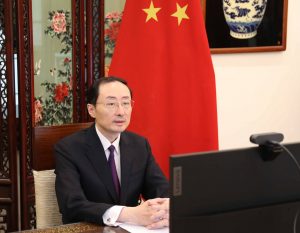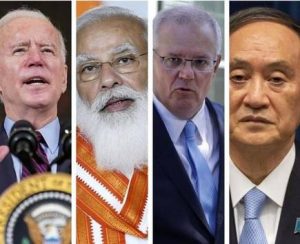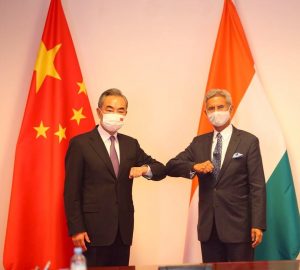
By Shweta Aggarwal
Ahead of the first in-person Quad summit in Washington, China’s Ambassador to India Sun Weidong has cautioned New Delhi to refrain from “closed and exclusive small cliques with the aim of containing a third party,” and underscored the imperative of bringing India-China relations, stressed by the border standoff in Ladakh, “back on track.”
In a critique of the Quad grouping of India, US, Australia and Japan, suspected by China of containing its rise, the Chinese envoy said: “At present, some countries, with their ideological bias and Cold War mentality, vigorously seek closed and exclusive “small cliques” with the aim of containing a third party, stoking bloc confrontation and geopolitical games.”
“In fact, containing others will not benefit a country with better development, nor will ganging up with others make one more secure. Once getting on someone else’s ship, one is no longer able to have the steering in control,” said Mr Sun at the opening ceremony of the 4th High-level Track II Dialogue on China-India Relations, which was held virtually on September 24.

The virtual dialogue was co-hosted by School of International Studies of Sichuan University (SCU), China Center for South Asian Studies and Manohar Parrikar Institute for Defence Studies and Analyses (MP-IDSA) in India.
The envoy cited the US’ botched exit from Afghanistan as a cautionary tale of consequences of meddling in international affairs of other countries. “Twenty years ago, when the U.S. started the Afghan War, many countries boarded its chariot. Twenty years later, what benefits have these countries gained? We should uphold true strategic autonomy, not only in words, but more importantly, in deeds.”
In a spirit of realism, the Chinese envoy highlighted that “the current status of bilateral relations are obviously not in the fundamental interest of either side,” and exhorted India to take the path of peaceful development rather than confrontation and conflict.
“We should take the path of peaceful development to deliver a better life for our peoples, rather than repeat the mistake in history and choose a wrong path of confrontation and conflict between two major developing countries,” he said.
The envoy underlined that China will never seek hegemony or expansion and exhorted Indian people to avoid looking at China as India’s “major threat” and “strategic rival”. “It is a serious strategic miscalculation. If such judgment is translated into India’s foreign policy, it would probably become a “self-fulfilling prophecy”, which is not what we want to see,” he said.
“Both sides should remove disruptions to mutual trust, refrain from interference in each other’s internal affairs or engagement in any “alliance” or “quasi alliance” targeting the other, and avoid being alienated by third party.”
“The tone and tenor of the ambassador’s speech was largely positive and indicated Beijing’s intention to resolve the border standoff and start a fresh chapter in bilateral relations,” said Manish Chand, CEO and Editor-in-Chief, India Writes Network and India and The World magazine.
“The timing of the Track II dialogue is also significant as it is a signal of India’s willingness to defrost bilateral relations with Beijing and is a message to that while India will continue engaging with the Quad, it will also keep doors open for dialogue and rapprochement with its northern neighbour,” said Mr Chand, also the director, Centre for Global Insights India (CGII), a think tank focused on geopolitics and global affairs.
The envoy also exhorted India to resume economic relations which had been severely stressed by the Ladakh standoff, leading to India curtailing economic relations with China. Pointing out “huge potential in economic and trade cooperation between the two countries,” the envoy observed that bilateral cooperation has faced some restrictions imposed intentionally by the Indian side since last year. “We should build bridges instead of walls, complement each other instead of decoupling. It is hoped that India will provide a fair, just and non-discriminatory business environment for Chinese companies to invest and operate in India.”
“If all Chinese companies are driven away or squeezed out of the India market, what would India gain from it?” he asked.

Looking ahead, the envoy urged India to make the right choice to revive China-India relations, which have “come to a crossroad once again.” “Ultimately, China and India should work together to take the broad road of mutual respect, dialogue, cooperation and mutual benefit, rather than the narrow log bridge of mutual confrontation, suspicion, attrition and zero-sum competition,” he said.
Author Profile
- India Writes Network (www.indiawrites.org) is an emerging think tank and a media-publishing company focused on international affairs & the India Story. Centre for Global India Insights is the research arm of India Writes Network. To subscribe to India and the World, write to editor@indiawrites.org. A venture of TGII Media Private Limited, a leading media, publishing and consultancy company, IWN has carved a niche for balanced and exhaustive reporting and analysis of international affairs. Eminent personalities, politicians, diplomats, authors, strategy gurus and news-makers have contributed to India Writes Network, as also “India and the World,” a magazine focused on global affairs.
Latest entries
 DiplomacyJanuary 5, 2026India walks diplomatic tightrope over US operation in Venezuela
DiplomacyJanuary 5, 2026India walks diplomatic tightrope over US operation in Venezuela India and the WorldNovember 26, 2025G20@20: Africa’s Moment – The Once and Future World Order
India and the WorldNovember 26, 2025G20@20: Africa’s Moment – The Once and Future World Order DiplomacyOctober 4, 2025UNGA Resolution 2758 Must Not Be Distorted, One-China Principle Brooks No Challenge
DiplomacyOctober 4, 2025UNGA Resolution 2758 Must Not Be Distorted, One-China Principle Brooks No Challenge India and the WorldJuly 26, 2025MPs, diplomats laud Operation Sindoor, call for national unity to combat Pakistan-sponsored terror
India and the WorldJuly 26, 2025MPs, diplomats laud Operation Sindoor, call for national unity to combat Pakistan-sponsored terror







